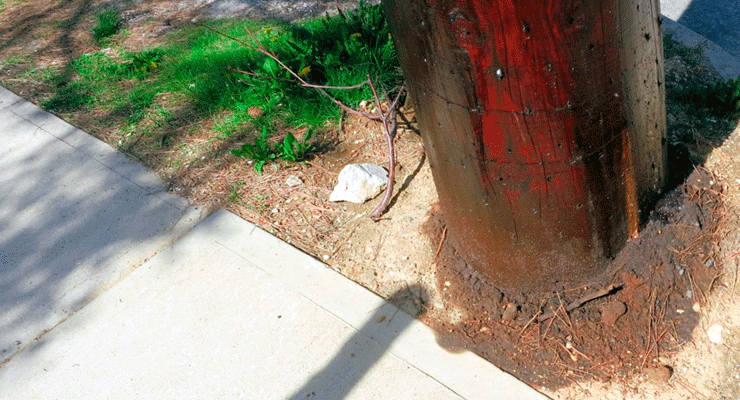
Here on Long Island, as all across America, “hurricane poles” are being placed in local communities to “harden” our infrastructure and provide jobs as a part of the “federal fast-track program.” Hardening means cutting trees and installing larger poles in residential and commercial areas.
Typically, the utility companies don’t announce their plans to the communities, and certainly don’t ask for input from residents. We saw this with PSEG Long Island’s recent installation of hurricane poles through Port Washington, Manhasset and Great Neck, as well as other parts of their service area. Utilities often justify the unannounced construction by citing eminent domain. Or, if necessary, after the giant poles are erected, they issue a mea culpa (ad maiorem gloriam potestatem).
In our case, the poles are not only tall, but also toxic.
PSEG provides power over wooden poles saturated with Pentachlorophenol (Penta). Penta is a PCP chemical produced by mixing and pressure-treating wood with lethal phenols, chlorine and F9-HTS biodiesel fuels. Penta preserves the wood from rot by killing any living organism in, on or up to eight feet around the pole.
With that chemical cocktail, Penta poles leach carcinogenic poisonous gases and liquids that the Environmental Protection Agency (EPA) says shouldn’t be encountered without protective clothes, gloves and masks.
Scary, huh?
To date, PSEG and LIPA have not issued a public safety announcement nor posted signs warning of:
1. Prenatal teratogenic effects (that is, congenital deformities) from hexachlorodioxin, a contaminant of pentachlorophenol
2. Fire departments needing to handle burning poles as HAZMAT (hazardous material)
3. The dangers to children who might absorb poison from the poles by playing around them, touching them, or eating—even breathing—nearby.
So how does PSEG get away with using such a powerful toxin throughout our communities?
The answer traces back to the EPA.
With pesticides such as Penta (yes, it’s considered a pesticide), the EPA doesn’t “approve” the compounds, rather, the agency “registers” them. Penta has been registered and reregistered for use, provided “that risk mitigation measures are adopted” and “that Pentachlorophenol will not pose unreasonable risks to humans or the environment.”
The EPA reviews the impact of the pesticide, but its thoroughness may be less than most of us would expect. As the EPA sees it, “The purpose of the Agency’s review is to reassess the potential hazards arising from the currently registered uses of the pesticide; to determine the need for additional data on health and environmental effects; and to determine whether or not the pesticide meets the ‘no unreasonable adverse effects’ criteria of Federal Insecticide, Fungicide, and Rodenticide Act (FIFRA).”
FIFRA does not use the word “adverse.” Rather, it looks for unreasonable “risk,” as in “any unreasonable risk to man or the environment, taking into account the economic, social and environmental costs and benefits of the use of the pesticide,” or “a human dietary risk from residues that result from a use of a pesticide in or on any food inconsistent with the standard.”
And even the EPA admits it is out of touch with the real-world uses of these chemicals, such as on utility poles.
“The Agency’s exposure models were designed to assess risk from agricultural chemicals; exposure estimates are expected to be conservative and may not be representative of ‘real world’ exposure.”
That’s very bad news for those of us here in the “real world.”
About the only good news is the fact that all of this federal fumbling does not preclude state and local governments from clamping down on the use of poisons such as Penta. It is essential that we — and local officials — make it clear to PSEG that we don’t want Penta in our soil and definitely not in our neighborhoods.
Chuck Idol lives in Port Washington. He holds multiple degrees, certifications, patents and copyrights in technology, and is the owner of Long Island Builders, LLC. Email: ChuckIdol@LongIslandBuilders.com


















